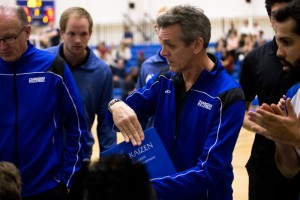On Tuesday, November 18, the Pacific Western Athletic Association (PACWEST), which the Camosun Chargers are members of, announced that it was cancelling the 2020/2021 athletic season. The statement said the decision was made to “ensure the health, safety and well-being of member institution’s [sic] student-athletes, coaches, athletics programs, and their surrounding communities.”
While Chargers men’s volleyball coach—and former national team captain—Charles Parkinson says he doesn’t know what this will mean long-term for the Chargers, for the time being, he’s focusing on diving even deeper into the training process, one that comes without the pressure of having to win games.
“My goal is for us, at the end of this period—these guys will have had probably around 180 hours of pure skill-based development,” says Parkinson. “And I mean, man, you can’t get that anywhere. It’s a gift. And we have to look at it through that lens. I think we have to believe this is an opportunity for us, it’s not hardship.”

Parkinson says that while it’s unfortunate that the team can’t compete this season, part of using this time to the Chargers’ advantage is creating competitive, game-like situations so that the players don’t lose their competitive edge.
“We will try to provide those competitive experiences so guys stay sharp, and you don’t get stale with, just, you know, too much training,” he says. “We do a lot of team-based training right now so that we don’t get stale, so that guys still get that competitive urge and they get a chance to compete against each other.”
There’s nothing anyone can do about the fact that student athletes are missing the opportunity to play against athletes from other institutions, so Parkinson says the team “has to accept it and move on.” But there is still work to be done: part of what Parkinson does is help make sure the student athletes remain academically eligible. (Players have to be full-time students and pass a total of 18 credits per academic year.)
“This is really important to me as a faculty member, but also as a parent with kids who have gone through this system. At the end of the day, volleyball’s a moment in time, when you’re looking at this from a life perspective, but your education is forever, and so, when you come to Camosun to play for me, I don’t want you just to come and play volleyball. I want you to come and be a student-athlete and enjoy everything that’s connected to that.”
Parkinson says he wasn’t at all surprised when the season was cancelled, given that the schedule dictates that students have to travel to different regions of the country.
“When you’ve got an increasing rate of positive [COVID-19] tests, and the fact that we would have to travel to the Fraser Valley and to Vancouver—which are two of the hot spots—I think we always have to think of the safety of our student athletes first.”
With the athletes training on site at the Pacific Institute For Sport Excellence at Camosun’s Interurban campus, extremely stringent protocols are being followed, says Parkinson, who mentions physical distancing, mandatory mask-wearing, and frequent disinfecting in buildings. Part of the issue is that it’s relatively easy to control protocols in your own venue, but travelling to different venues would, in addition the risk of travel, mean that the players wouldn’t be able to make certain that all protocols were being followed.
“We want to be able to keep training,” says Parkinson, “so the only way to do that is to keep staying safe.”
Looking down the road, Parkinson isn’t sure how the turnover of players will impact the program. Current student athletes will not lose a season of eligibility, but next year, similar numbers of first-year students will want to come in and play; Parkinson says it’s very difficult for a first-year student to compete with a third- or fourth-year student who has a couple of years of experience playing at the college level.
“I think it’s important for coaches to be loyal to guys that have committed to them,” he says. “If you don’t have anybody that’s moving on, how do you accommodate new guys coming in? This is not [just] me, I think this is going to be a problem for all post-secondary programs as it relates to the current Grade 12s, because it’s very rare you’re going to get a Grade 12 athlete who’s going to beat out a second- or third-year student athlete who has had that experience at the college level.”
